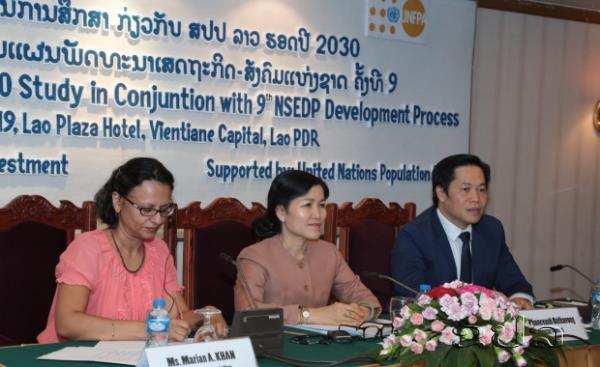Vientiane Capital, Lao PDR –With strong support from the government of the Lao PDR, the United Nations Population Fund (UNFPA), together with the Ministry of Planning and Investment, formally launched in Vientiane on Sep 18 the Lao PDR 2030 study, an important study focusing on population dynamics and its linkages to development priorities.
Development planning and policy-making require solid data and analyses of current and future population trends and understanding of the social and economic consequences of population dynamics.
The study Lao PDR 2030 aims to inform the planning of the 9th National Socio-Economic Development Plan (NSEDP) for 2021-2025 by generating quality analyses on population dynamics and relevant implications on education, health, labour, gender equality, poverty reduction, and other priority areas of development.
As a major study involving multiple sectors, the Lao PDR 2030 attracted extensive participation from the inception stage. Relevant line ministries, Center for Development Policy Research and other leading national research institutions, and international development partners attended the kick-off meeting for this multi-stakeholder study held in Vientiane.

Ms. Phonevanh Outhavong, Director General of Department of Planning, Ministry of Planning and Investment, leads national coordination of the Lao PDR 2030, said “Initiating the Lao PDR 2030 Study now is opportune as it intertwines with the planning process of 9th NSEDP. The evidence and policy recommendations from the study will enable the next NSEDP to better respond to the changing population dynamics in the country.” In addition to coordinating the consultation process, the MPI is also committed to supporting the dissemination of the findings upon the completion of the study to ensure effective utilization of the findings in the formulation of policies in various sectors.
Ms. Mariam Khan, UNFPA Representative in the Lao PDR stressed that: “As we celebrate the 25th anniversary of International Conference on Population and Development (ICPD) this year, the Lao PDR 2030 is of vital importance to guide the national government and development partners to accelerate our promises in achieving the ICPD vision and the sustainable development goals (SDGs).” UNFPA has been supporting the Lao government to enhance national capacity to generate and utilize high-quality disaggregated population data. The Lao PDR 2030 study will not only inform the planning 9th NSEDP, but it will also provide insights for the Least Developed Country (LDC) graduation process and further advance the 2030 agenda in the Lao PDR.
Mr. Youssef Courbage, the lead UNFPA technical consultant for the Lao PDR 2030, presented the methodology and scope of the study. He illustrated with case studies how countries could reap potential demographic dividends by putting in place social policies that respond to population dynamics.
He concluded: “In the quest of sustainable development, the youthful country of Lao PDR has a window of opportunity with nearly 60% of population below 25 years old. In line with projections and analyses of population trends leading to 2030, the study will propose options for equitable investments in education, health, empowerment of women and girls to unleash the full potential of young people in the Lao PDR”.
While promising progress is being made in the LDC graduation process, challenges remain in the Lao PDR, such as the adolescent fertility rate standing at the highest in ASEAN and gender disparities prevailing in education, health, formal employment, and access to social security. Experiences from other countries showed that to reap the demographic dividend, equitable and sustainable development strategies, including focused investments in adolescents and youth, increased access to sexual and reproductive health care, and empower women and girls are required. With in-depth analyses of population trends, the Lao PDR 2030 will form the basis for evidence-based policymaking and social investments.
The participants discussed the methodology of the study and also shared suggestions regarding further steps to strengthen the quality of the study for it to feed into the planning process of the 9th NSEDP.
For more information please contact:
Mr. Phonexay SITHIRAJVONGSA, Monitoring and Evaluation Officer, UNFPA Lao PDR
Email: sithirajvongsa@unfpa.org
************
UNFPA, the UN's sexual and reproductive health agency, works in over 150 countries including Lao PDR, to achieve zero maternal deaths, zero unmet need for family planning and zero gender-based violence, and harmful practices towards women and girls.


